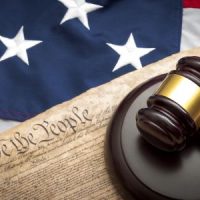Five Proof Requirements in a Criminal Case

Most criminal cases, and most post-trial criminal proceedings, settle out of court. Nevertheless, the burden of proof at trial may be the biggest factor in these resolutions. At every level, attorneys always look to the likely outcome at a trial or hearing and base their negotiation positions on that prediction. The burden of proof varies in different proceedings, as outlined below.
Almost all criminal cases go through the first three stages discussed below. Many encompass the last two as well. A Tampa criminal defense lawyer must be mindful of the burden of proof at all five stages. Only in this way can a lawyer successfully resolve a criminal case out of court, and reduce or eliminate the harsh direct and indirect consequences of a criminal conviction.
Reasonable Suspicion
When the Supreme Court created the reasonable suspicion rule, which is part of the Fourth Amendment’s restrictions on searches and seizures, it was an ironclad policy. Recently, the Supremes have watered down the reasonable suspicion rule. But the doctrine itself remains in place.
Basically, before they detain a possible criminal suspect, officers must have an evidence-based hunch of criminal activity. A hunch alone, like motorists who act nervous when they see police cars, is insufficient. A hunch justified by evidence (e.g. an officer who follows a “suspicious” vehicle until the driver commits a traffic violation) is likewise insufficient.
Probable Cause
The burden of proof moves up a notch if officers arrest suspects. Here, the burden is probable cause, which basically means the defendant is “probably” guilty.
A 2015 Iowa case illustrates the probable cause rule. Sheriff’s office deputies arrested a man for traveling 66mph in a 65mph zone. Even though the margin of error for that particular RADAR gun was 1mph, and officers knew the case wouldn’t hold up in court, a judge ruled officers had probable cause to give the defendant a speeding ticket.
Incidentally, deputies had been watching the defendant because he was a suspected drug dealer. The judge also ruled that the officer’s motives were irrelevant, a ruling that goes back to the watered-down reasonable suspicion rule discussed above.
Beyond a Reasonable Doubt
Florida law defines the standard of proof at trial as beyond a “mere possible doubt, a speculative, imaginary or forced doubt.” Additionally, unless jurors have “an abiding conviction of guilt,” they have a reasonable doubt as to the evidence.
To take full advantage of this rule, a Tampa criminal defense lawyer often presents an alternative theory that also fits the facts. For example, in the famous 2010 Casey Anthony case, her lawyer argued that little Caylee Anthony wasn’t murdered, but she fell into a swimming pool and drowned, and her panicked family covered it up.
Preponderance of the Evidence
Most criminal defendants receive probation. Usually, probation has so many terms and conditions that almost everyone violates at least one of them at one time or another. A probation revocation motion could hold up in court if the prosecutor proves, by a preponderance of the evidence (more likely than not), that the defendant violated probation.
Possession of a prohibited substance is a good example. At trial, because the burden of proof is so high, possession is difficult to establish. But if the burden of proof is lower, mere proximity is usually sufficient.
Material Error
When defendants appeal their convictions, they must prove that a material error changed the trial’s outcome. Courts have consistently held that defendants are entitled to fair, but not perfect, trials. Alternatively, a lawyer could prove that the judge abused his/her discretion. If a pitcher throws a ball that hits the backstop and the umpire calls that pitch a strike, the umpire abused his discretion.
Rely on a Diligent Hillsborough County Attorney
A criminal charge is not the same thing as a criminal conviction. For a confidential consultation with an experienced criminal defense lawyer in Tampa, contact the OA Law Firm. We routinely handle matters in state and federal court.
Source:
themarshallproject.org/2020/11/04/the-truth-about-trials




